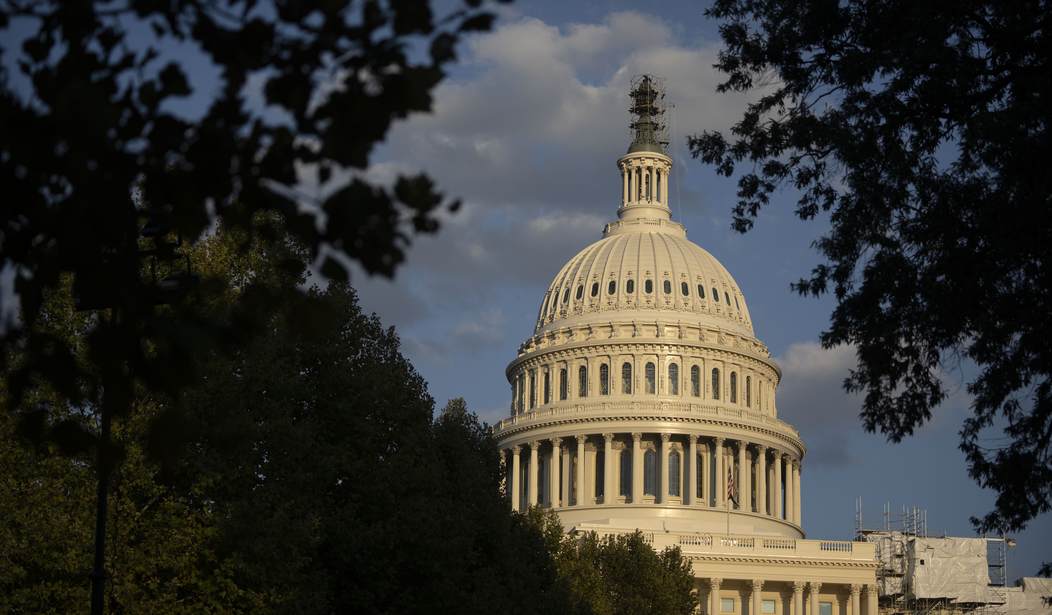As of Friday afternoon, it is looking increasingly likely that the government is headed for a shutdown on midnight at October 1. Even if they can't come to a resolution so as to fund the government in time for 2023, Republican members of Congress in both chambers have some ideas that could prevent ones in the future.
On Tuesday, Sen. Tommy Tuberville (R-AL)'s office announced he had joined Sen. James Lankford (R-OK) in co-sponsoring bipartisan legislation known as the Prevent Government Shutdowns Act of 2023. Lankford had reintroduced the bill on January 30 of this year, initially introduced in February 2019.
According to a press release from Lankford's office, the bill "requires that if appropriations work is not done on time, all Members of Congress must stay in Washington, DC, and work until the spending bills are completed," which the release noted "will prevent a government-wide shutdown, continue critical services and operations for Americans, and hold federal workers harmless while Congress completes appropriations."
So as to prevent a shutdown, the release also noted that "[u]pon a lapse in government funding, the bill would implement an automatic continuing resolution (CR), on rolling 14-day periods, based on the most current spending levels enacted in the previous fiscal year."
The following restrictions would also be in place:
- No taxpayer-funded travel allowances for official business (except one flight to return to Washington, DC) for the following:
- White House OMB staff and leadership
- Members of the House and Senate
- Committee and personal staff of the House and Senate
- No official funds may be used for CODEL or STAFFDEL travel
- No use of campaign funds by congressional offices to supplement official duties or travel expenses
- No motions to recess or adjourn in the House/Senate for a period or more than 23 hours
In addition, under the bill, no other votes would be in order in the House and Senate unless they pertain to passage of the appropriations bills or mandatory quorum calls in the Senate. However, after 30 days under the automatic CR, certain expiring authorization bills and executive calendar nominations would be eligible for consideration on the Senate floor, including a nomination for a Justice of the Supreme Court or a Cabinet Secretary, and narrow reauthorization legislation for programs operating under an authorization that has already expired or will expire within the next 30 days.
Recommended
Such restrictions can be waived upon a vote of two-thirds, but not more than seven days.
"Shutting down the government does not solve the problem. It creates new problems. But currently there are very limited methods to focus Congress on the national debt. Forcing Congress to stay in DC until the budget work is done is the most effective way to get Congress to actually get the government funded on time. This is a commonsense non-partisan solution to put the pressure on lawmakers instead of hurting federal families and services during a shutdown," Lankford's statement at the time mentioned in part.
Lankford had reintroduced the bill with Sen. Maggie Hassan (D-NH), who had called the bill "commonsense." At the time, other senators included Sens. Kyrsten Sinema (I-A), Ron Johnson (R-WI), John Barrasso (R-WY), Bill Cassidy, M.D. (R-LA), Steve Daines (R-MT), Angus King (I-ME), Rick Scott (R-FL), Mike Braun (R-IN), and Mark Kelly (D-AZ).
Another hot topic as the government heads for a shutdown is members getting paid. Rep. Matt Gaetz (R-FL), one member who has been in the news quite a bit for his threat to Speaker Kevin McCarthy's (R-CA) gavel if a short-term spending bill passes.
Axios included Gaetz first in the list of "hard-right Republicans pushing the U.S. toward a government shutdown." As that report mentioned:
Context: Many of the GOP holdouts this time around were also behind the historically prolonged vote to elect McCarthy as speaker earlier this year.
- To claim the gavel, McCarthy reached an agreement with more than a dozen GOP detractors that allowed them to wield more power.
- One of his strongest detractors, Matt Gaetz, is now wielding that power by threatening to introduce a motion to vacate — a mechanism to oust a speaker — if McCarthy backs a bipartisan stopgap funding bill to avert a government shutdown.
...
Matt Gaetz of Florida
Gaetz, one of McCarthy's most vocal opponents, has continued criticizing McCarthy's leadership and argued that a short-term spending bill would breach the agreement he made with conservatives to become speaker.
- On Thursday, the two had a confrontation in which Gaetz accused McCarthy of paying influencers to attack him on social media.
- "If the folks in my district want somebody who's just going to vote for continuing resolutions and omnibus bills, they've had other choices," Gaetz told Axios on Wednesday, referring to standard short-term and long-term spending bills that have become a decades-long feature of Congress. "But they chose to send me, and I'm here to fight."
Where Gaetz and McCarthy do seem agree though is that they'd be willing to not a paycheck in the event of a government shutdown. The Washington Examiner reported on Monday that Gaetz is asking for the House to withhold his paycheck if the government shuts down. The congressman reposted it over his official X account.
OMB Director Shalanda Young had a sarcastic response, though, pointing out that members constitutionally have to get paid.
"House @SpeakerMcCarthy says that he's not going to take a salary during a shutdown. Does the president plan to pause his salary?"
— RNC Research (@RNCResearch) September 29, 2023
Biden budget director Shalanda Young: "That's theater" pic.twitter.com/wCijP7r4Jr
On that front, Reps. Ralph Norman (R-SC) and Vern Buchanan (R-FL) have introduced a constitutional amendment where withholding pay would not be "theater."
"This constitutional amendment would prohibit Member pay while a government shutdown is in effect without receiving backpay. It is the intent of the bill to encourage congressional leadership to pass all 12 appropriations bills on time," a press release from Norman's office reads.
Statements from both members pointed out that other jobs wouldn't pay people for not working.
"Nowhere else in America would employees get paid for failing to do their jobs, yet that's exactly what happens for Members during a shutdown. That's inappropriate, and it's time to amend the Constitution to prevent that from happening," Norman's statement said in part.
"No small business in America would pay someone who refuses to do their job," said Buchanan. "So why should taxpayers pay a Congress that fails to perform one of its most fundamental responsibilities – funding the federal government? They shouldn’t, which is why I’m pleased to help introduce this legislation to block paychecks for senators and members of Congress during a government shutdown."
An article for Straight Arrow News pointed out that, with original emphasis, "Congressional leadership earns even more than rank-and-file members. House Speaker Kevin McCarthy, R-Calif., makes $223,500, while party leaders in both chambers earn $193,400. President Biden’s $400,000 salary works the same way; he’ll keep getting paid, too."
























Join the conversation as a VIP Member